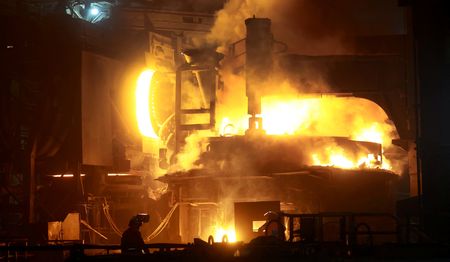By Kate Holton and Susanna Twidale
BRIDGNORTH, England (Reuters) -In the cradle of the industrial revolution, Britain’s only aluminium coil mill has spent millions of pounds to save energy, reduce its carbon footprint and shield itself from some of the highest electricity costs in the world.
But when Bridgnorth Aluminium’s electricity use slips below the threshold to qualify for a government subsidy that helps businesses with their bills, it cranks everything up again to avoid missing out on the financial payout.
“Our finance guy sat us down at the end of the year and said it’s okay to leave the lights on a bit more now. Which is kind of weird and counterproductive,” Adrian Musgrave, the head of sales at Bridgnorth Aluminium, said.
This paradoxical situation stems from Britain’s sky-high electricity costs, coupled with the piecemeal support successive governments have given to big industrial power users.
According to the International Energy Agency, large energy intensive companies in Britain paid about four times more for electricity last year than U.S. businesses, and more than double competitors in France and Germany.
Besides hitting competitiveness and contributing to stubbornly high British inflation rates, power prices have acted more generally as an obstacle to Britain’s shift towards cleaner energy and the government’s goal of hitting net zero by 2050, according to more than 25 industry figures including business owners, energy managers and policy experts.
They said high power costs have stripped companies of the cash to invest in more efficient machinery, deterred them from moving to lower-carbon electricity sources, and prevented some from competing with foreign rivals to make the wind farms, pylons and batteries needed for a net zero future.
“This is the number one barrier to delivering net zero in the UK at the moment,” said Rachel Solomon Williams, head of the Aldersgate Group, which works with companies and government on policies to help them decarbonise. “It will materially hinder net zero if we can’t do something about electricity costs.”
Britain’s new centre-left Labour government sees the energy transition as a way to fuel much-needed economic growth, with the creation of highly skilled manufacturing jobs and innovative companies that can export their expertise.
FOSSIL FUEL ROLLERCOASTER
Prices are higher in Britain than most countries because even though it generated more than half its electricity last year from cheaper renewables such as wind and solar, the price is almost always set by gas, which is more expensive.
Wholesale electricity prices are set every 30 minutes by the cost of the last energy source used to ensure demand is met. So even if wind, solar and nuclear provide 99% of the power needed, if gas-fired plants are needed to hit 100%, then gas sets the wholesale price for every buyer and seller alike.
On top of that, part of the cost of building renewables and upgrading the energy network comes from electricity bills, rather than from tax revenues, with levies making up about 40% of the average bill.
Other countries in Europe use the same marginal cost pricing structure in wholesale electricity markets but in France, for example, the vast majority of its power comes from nuclear meaning gas sets the price less frequently.
To bring costs more in line with big European markets, the British government has proposed removing 90% of grid network charges for the most intensive energy users, up from 60% now.
At Bridgnorth, staff have been trained to minimise energy usage, lights dim when part of the factory is not being used, and the design of the furnace fans is being changed so smaller, less energy intensive motors can be used.
It gets a chunk of its power from a nearby anaerobic digestion plant that creates clean energy from food waste and would like to build a solar plant on site and take other steps to make its electricity more efficient, but that would push it below the threshold for government support.
It would also like to recycle scrap to build a circular economy but high energy costs have curbed its ability to invest.
“Our monthly spend on energy is 1 million pounds ($1.35 million), so you quickly understand the importance of factoring energy into our strategic thinking,” Musgrave said.
Bridgnorth is part of the British Industry Supercharger scheme, where companies making core products such as steel, glass and chemicals – and spending more than 20% of their economic output on power – are exempt from green levies and most network costs.
Bridgnorth, which makes large sheets of rolled aluminium, carefully tracks how much it produces, and its energy costs, to avoid dropping below the 20% threshold – and losing 3 million pounds a year in support.
A government spokesperson said Britain was investing to get the country “off the rollercoaster of fossil fuel markets”.
“After a decade of inaction on industrial energy prices, we are slashing the electricity costs for thousands of businesses by up to 25%, making them more competitive and unlocking growth,” they said.
‘THIS IS JUST BONKERS’
Bridgnorth Aluminium is not alone in struggling to stay competitive while navigating the shift to net zero emissions when faced with such high electricity prices.
Just over a mile away is Grainger & Worrall, a pioneer in the world of “gigacasting”, a technique adopted by electric vehicle makers such as Tesla to cast large, lightweight structural parts in one go.
It makes casts out of sand and, to eliminate waste, it recycles it, but that takes huge amounts of energy.
“It’s making us less and less competitive, which is bizarre, but it is the right thing to do,” Chief Executive Duncan Eldridge said. “What it means is that we are spending more money on electricity, and less money on capital investment.”
For Amtico, a flooring company in Coventry also in Britain’s historical industrial heartland, energy costs became so high it crunched the numbers to see if it could find alternatives to the grid, Chief Executive Jonathan Duck said.
The conclusion? The cheapest option was to build a gas-fired heat and power plant on site – still paying for gas but avoiding many of the fees and levies that make up nearly 60% of electricity bills for industrial users.
“I’m kind of scratching my head going, well, this is just bonkers, because the structure of the market is encouraging me to set up my own gas-fired power station, when that shouldn’t really be the future,” he said.
Amtico chose not to build the plant, because it did not feel “morally right”.
And in the Welsh capital Cardiff, 7 Steel UK, which uses an electric arc furnace to make the low-carbon steel that goes into wind farms and electricity pylons, takes a radical approach.
When wholesale prices get too high, it simply switches off its thunderous furnace, sometimes halting production for days at a time. Last year, due to high costs and sluggish demand, the furnace only operated at just over 70% capacity.
“Decarbonisation work in the UK is reliant on steel, yet we don’t seem to be really grasping that concept,” said Gabriella Nizam, 7 Steel’s head of sustainability.
‘IN SURVIVAL MODE’
To stop non fossil fuel power generators making excessive profits from high electricity prices, the government introduced a windfall tax on them in January 2023. It is due to end on March 2028.
Successive governments have also looked at how to break the link between gas and electricity prices, including by offering renewable energy directly to consumers in a green power pool rather than through the wholesale market.
Michael Grubb, an energy policy expert at University College London, said while the government had acknowledged this could work, it was untried and considered too radical.
“Their priority was trying to get maximised investment,” he said.
Green energy advocates and many policy experts say Britain is in the expensive investment phase of its energy transition, and prices will come down when more renewables come on stream and gas is used less to meet demand.
But for now, it is complicating the energy transition.
Britain had early success in cutting emissions, building one of the world’s biggest offshore wind sectors to phase out coal over the past 15 years. It is now aiming to generate at least 95% of its domestic electricity from low-carbon sources by 2030, with 65% coming from non fossil fuel sources last year, data from Ember showed.
To reach net zero, Britain needs its heating, transport and manufacturing industries to switch away from fossil fuels, but these sectors are also deterred by high electricity costs.
Japanese carmaker Nissan says its British plant has the highest electricity costs of any of its facilities worldwide, threatening its ability to make EVs there.
IHG, one of the world’s biggest hotel companies, says its British hotels have struggled to follow those in Europe and southeast Asia in adopting hot water heat pumps to cut emissions, because the running costs are prohibitive.
Many of the companies Reuters spoke to, particularly in heavy industry, question how long they can keep going when high electricity costs prevent them from investing to keep up with international rivals.
“We are constantly in survival mode,” 7 Steel’s Nizam said. “We will eventually get there, but the question is what will be left of the sector by that time?”
($1 = 0.7402 pounds)
(Reporting by Kate Holton in Bridgnorth, Cardiff and London, Susanna Twidale in London; Editing by David Clarke)
















